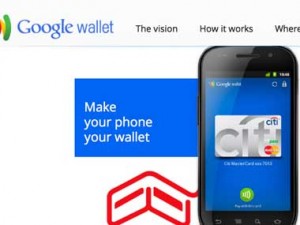The race for the digital wallet is on. Google, PayPal, major credit card companies and possibly Apple are all rushing to replace your credit card with your mobile phone. The search giant announced its Wallet service in May, and the first pay terminals for the service have been spotted in San Francisco by a reporter for digital media site GigaOm. That sighting came after TechCrunch posted instructions being sent around to partners indicating a 19 September launch. As TechCrunch notes, the launch coincides with an industry conference on NFC, near-field communications, the technology that turns your mobile phone into into something you can buy coffee with. All you have to do is tap a terminal with your phone to make a payment. [caption id=“attachment_87590” align=“alignleft” width=“300” caption=“Google’s Wallet service”]  [/caption] But to take advantage of Google Wallet, you’ll have to be the owner of a Nexus S smartphone and either a Citi MasterCard or a Google PrePaid card. Without knowing how the circles of that Venn diagram overlap, it’s impossible to say how many people might actually be able to use the service on day one. NFC payments have been rumoured for years but have yet to take off outside of Japan. It’s worth saying that you can do more than just make payments with NFC. Transit systems are expected to use it for ticketing and retailers can send digital coupons to consumers. Special offers can be delivered to you based on your location as part of NFC services, such as those that will be offered by electronic payments company PayPal. Other handset manufacturers are also including NFC technology in their handsets. Last week we reported that it will soon be available on Research in Motion's Blackberry handsets :
“But implementation of NFC for purchases has been stymied by the competing interests of banks, merchants, device makers and even wireless carriers all eager to get a cut.”
Technology consultancy Gartner, famous for its hype cycle, said that NFC had “moved into the Peak of Inflated Expectations” this year. After the peak, the trough of disillusionment awaits. One of the common concerns about digital wallets are that if thieves steal your phone, they not only have your mobile, they also have your money. Google Wallet does have an overseas activity alert, but the industry will have to do a lot more to convince the average consumer, who has probably suffered a few credit card compromises in their time, to trust this new technology. Despite worries about security, fragmentation and competing interests, NFC finally seems to be moving from hype to reality. All the major handset manufacturers including Apple and Nokia are reportedly working on adding the technology to their handsets. Apple’s iPhone 5 has often been reported as including NFC. And other systems are in the works from credit card companies and mobile phone networks. In the US, a digital wallet system called ISIS backed by AT&T, T-Mobile and Verizon is expected to launch next year. The real question becomes: Who will win with so many providers? It’s going to be confusing for consumers, and history shows that when it comes to competing technology, most consumers will sit out the early industry battle until clear winners emerge.


)

)
)
)
)
)
)
)
)



